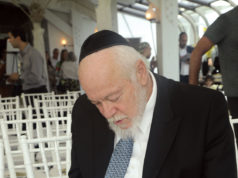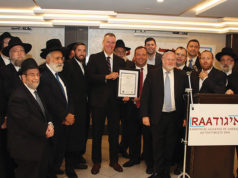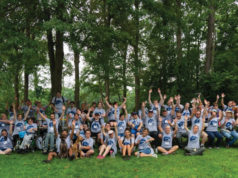 Four Orthodox synagogues, a mikveh, a kosher coffeehouse and separate boys and girls religious high schools suggest a community far larger than just 750 Jews. But Gibraltar, the tiny British overseas territory of 30,000 that sits at the foot of Spain and at the gateway to North Africa and the Mediterranean, has spent centuries cultivating its individuality.
Four Orthodox synagogues, a mikveh, a kosher coffeehouse and separate boys and girls religious high schools suggest a community far larger than just 750 Jews. But Gibraltar, the tiny British overseas territory of 30,000 that sits at the foot of Spain and at the gateway to North Africa and the Mediterranean, has spent centuries cultivating its individuality.
The community is vibrant, hospitable and Orthodox. Its a little community with a big heart, run by the Managing Board of the Jewish Community. The Board is involved in all aspects of lay and religious communal life. Religious issues are the province of their esteemed Communal Rabbi, Rabbi Roni Hassid, who has served and led them for 25 years.
Community members actively involve themselves in maintaining and developing the quality of Jewish religious, social, educational and cultural life. There are many support networks.
Weve got an infrastructure that could cope with a community of 2,000, and weve only got 700, said Mark Benady, a native Gibraltarian and vice president of the territorys Jewish community.
Gibraltars Sephardic Jewish community has grown substantially in the past decade, increasing by 25% in just the last three years. The Jewish primary school now has a record 140 pupils and recently added a floor of modern classroom space with the help of government funding. Along the way, the community has become more religiously observant and, many say, more insularyet their relations with other faiths are exemplary and are often remarked upon by local residents, and visitors from abroad.
Fueling the growth in part are loans of 10,000 pounds ($15,500), repayable over 15 years, that were issued by the community to attract newcomers, who arrived mainly from England and Spain.
Jews have lived in Gibraltar since 1356, however for more than 200 years, beginning with the expulsion of Jews from the Iberian Peninsula in 1492, there was no Jewish life there. That changed in 1713 when Britain took control of the territory.
In the centuries since, Jews have occupied major political positions. In 2008-09, the largely ceremonial post of mayor was occupied by Solomon Levy.
Theres a warmth and closeness brought by a sense of shared purpose in Gibraltars Jewish community.
Its very much a community where everyone feels like family and joins together for joyous occasions and sad occasions as well.
English is the official language, the queen is head of state and the Gibraltar pound is the official currency. The Spanish influence remains strong. Native Gibraltarians speak their own language, Llanito, a blend of English and Spanish with a sprinkling of Hebrew.
Idan Greenberg, an Israeli who moved to Gibraltar with his wife a few years ago, runs the Verdi Verdi kosher coffeehouse, in an open-air plaza dotted with boutiques, cafes and pubs at the entrance to Main Street.
With its chic brown-and-gold suede seating and vibrant orange chairs, Verdi Verdi wouldnt be out of place on the Upper West Side of Manhattan.
Greenberg said he wants his restaurant to appeal to Gibraltarians, but laments the insularity he associates with the communitys increasing piety. The isolation is a concern. The closeness yields little room for Jews who dont observe in the Orthodox fashion. There are no non-Orthodox synagogues in Gibraltar, and the community observes the religious dicta published by the relatively strict Orthodox religious court in London. The social life very much revolves around Shabbat. Theres a careful line that must be drawn between assimilation and isolation.
I think weve managed to draw the line in a comfortable place, said one Gibraltarian who does not believe there is a problem.



